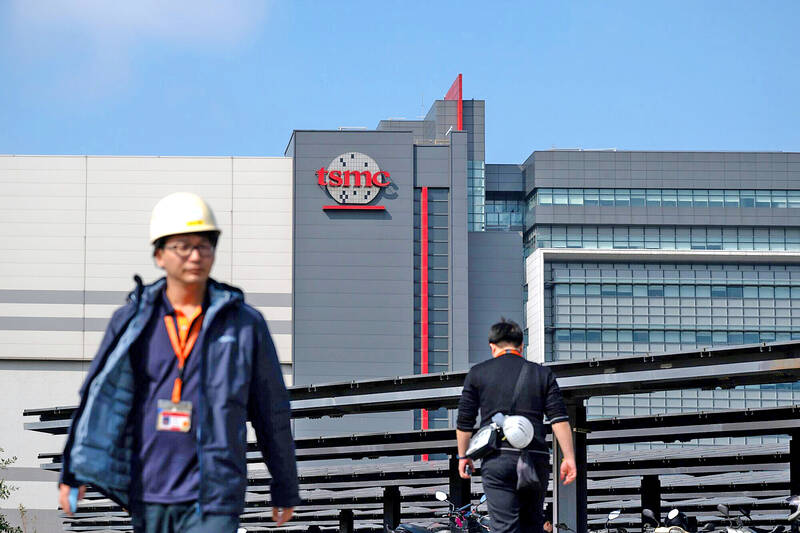Taiwan Semiconductor Manufacturing Co (TSMC, 台積電) yesterday reported about 60 percent annual growth in revenue for last month, benefiting from rapidly growing demand for artificial intelligence (AI) and high-performance computing applications.
Revenue last month expanded to NT$236.02 billion (US$7.28 billion), compared with NT$147.9 billion in April last year, the second-highest level in company history, TSMC said in a statement. On a monthly basis, revenue surged 20.9 percent, from NT$195.21 billion in March.
As AI-related applications continue to show strong growth, TSMC expects revenue to expand about 27.6 percent year-on-year during the current quarter to between US$19.6 billion and US$20.4 billion.

Photo: Mike Kai Chen, Bloomberg
That would mean a sequential growth of 6 percent, the chipmaker told investors last month.
“Almost all the AI innovators are working with TSMC to address the insatiable AI-related demand for energy-efficient computing power,” TSMC CEO C.C. Wei (魏哲家) told an investors’ conference.
The chipmaker forecasts that server AI processor revenue would more than double this year from last year and account for a low-teens percentage of its total revenue this year, Wei said.
As a majority of AI accelerators and graphics processors utilize its advanced process technologies, such as 5-nanometer or 4-nanometer technology and beyond, revenue this quarter would be supported by strong demand for 5-nanometer and 3-nanometer technologies, TSMC said.
That would partly offset weakness in smartphone chip demand during the slack season and sagging demand for vehicle chips on excessive inventory, the chipmaker said.
Last quarter, 5-nanometer technology was the largest revenue contributor, accounting for 37 percent of the chipmaker’s total revenue, while 3-nanometer technology made up 9 percent, TSMC said.
The Hsinchu-based company said all its AI chip customers are working on further technology migration to energy-efficient 2-nanometer technology, considering that AI servers consume much more power than general-purpose models.
TSMC is scheduled to ramp up 2-nanometer technology in the second half of next year.
In a separate statement, TSMC said its board of directors has approved the distribution of a NT$4 per share cash dividend for the first quarter of this year, higher than the NT$3.5 a share paid for the final quarter of last year.
The company made NT$225.49 billion in net profit, or NT$8.7 per share, in the first quarter of this year. TSMC usually pays 70 percent of its free cash flow in a year as a cash dividend.
However, as it is harvesting from the heavy investment in the past few years, the chipmaker expects its cash dividend to “steadily increase” from a sustainable level in the past few years.
The cash dividend distribution is subject to the final approval of shareholders during the annual general meeting scheduled for June 4.

Application-specific integrated circuit designer Faraday Technology Corp (智原) yesterday said that although revenue this quarter would decline 30 percent from last quarter, it retained its full-year forecast of revenue growth of 100 percent. The company attributed the quarterly drop to a slowdown in customers’ production of chips using Faraday’s advanced packaging technology. The company is still confident about its revenue growth this year, given its strong “design-win” — or the projects it won to help customers design their chips, Faraday president Steve Wang (王國雍) told an online earnings conference. “The design-win this year is better than we expected. We believe we will win

Intel Corp chief executive officer Lip-Bu Tan (陳立武) is expected to meet with Taiwanese suppliers next month in conjunction with the opening of the Computex Taipei trade show, supply chain sources said on Monday. The visit, the first for Tan to Taiwan since assuming his new post last month, would be aimed at enhancing Intel’s ties with suppliers in Taiwan as he attempts to help turn around the struggling US chipmaker, the sources said. Tan is to hold a banquet to celebrate Intel’s 40-year presence in Taiwan before Computex opens on May 20 and invite dozens of Taiwanese suppliers to exchange views

Chizuko Kimura has become the first female sushi chef in the world to win a Michelin star, fulfilling a promise she made to her dying husband to continue his legacy. The 54-year-old Japanese chef regained the Michelin star her late husband, Shunei Kimura, won three years ago for their Sushi Shunei restaurant in Paris. For Shunei Kimura, the star was a dream come true. However, the joy was short-lived. He died from cancer just three months later in June 2022. He was 65. The following year, the restaurant in the heart of Montmartre lost its star rating. Chizuko Kimura insisted that the new star is still down

While China’s leaders use their economic and political might to fight US President Donald Trump’s trade war “to the end,” its army of social media soldiers are embarking on a more humorous campaign online. Trump’s tariff blitz has seen Washington and Beijing impose eye-watering duties on imports from the other, fanning a standoff between the economic superpowers that has sparked global recession fears and sent markets into a tailspin. Trump says his policy is a response to years of being “ripped off” by other countries and aims to bring manufacturing to the US, forcing companies to employ US workers. However, China’s online warriors